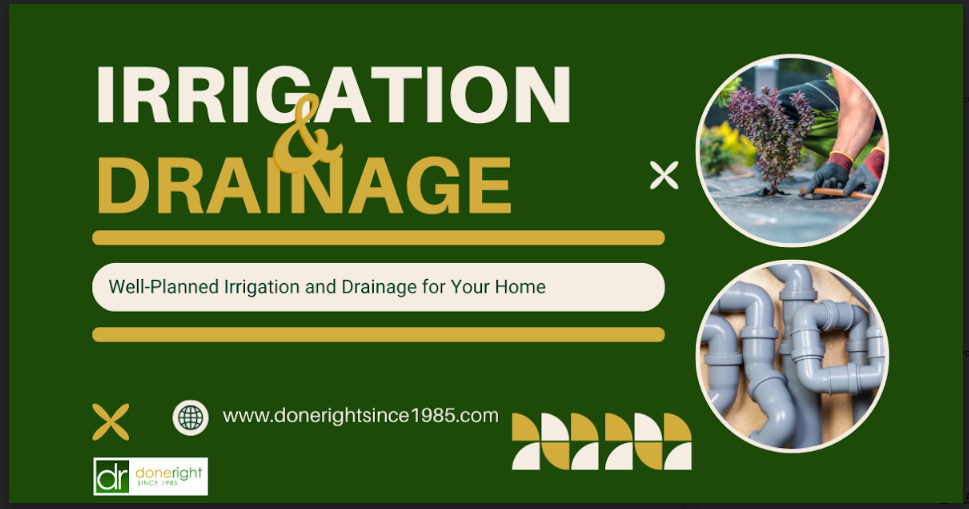It is essential to have a well-planned irrigation and drainage system for your home to maximize water efficiency. Drainage and irrigation system are two essential components of any outdoor landscaping project. When these systems are suitable, you can avoid wasting water and save money on your bills. You may also make sure that plants and grass get enough water. This blog post will go through how to design a well-thought-out system of watering and drainage for your home.
Factors to consider for irrigation and drainage systems
When creating an adequate irrigation and drainage system for your property, numerous vital elements must be considered. To ensure your system is well maintained, keep these factors in mind:
- Soil type
The soil type in your yard will affect how well water can penetrate it and how much drainage is needed. However, sandy soil drains more quickly, while clay soil holds onto water longer. Consider the soil type in your yard when designing your irrigation and drainage systems.
- Slope
The slope of your yard also affects how water drains. A steep slope may require additional drainage to prevent erosion. A flat slope may need more irrigation to distribute water evenly.
- Local climate
Understanding your local environment is essential for constructing an irrigation system that fulfills the demands of your landscape. A drip irrigation system, for example, may be more efficient in dry regions than a standard sprinkler system.
- Water source
Determine where your water source is located and the best way to get water to your irrigation system. Consider installing a rainwater collecting system to decrease water use and environmental effects.
- Plant type
The water requirements of different types of plants vary. It’s essential to design an irrigation system based on the types of plants in your yard.
By considering these factors, you can design an irrigation and drainage system that meets the specific needs of your landscape and maximizes water efficiency.
Types of drainage system
When it comes to building drainage systems for your home, you have various alternatives. Each kind has its own set of strengths and downsides. These characteristics, however, are affected by factors like soil type, water source, and budget. Here’s a rundown of the most typical drainage systems, along with their benefits and drawbacks:
- French drains
French drains are a popular option for managing excess water in yards. This type of drainage system involves digging a trench and filling it with gravel or other absorbent material, then adding a perforated pipe to redirect water away from your home. The benefits of French drains include their affordability and effectiveness in preventing standing water in low-lying areas. However, debris can block them over time, resulting in pricey repairs.
- Surface drainage
Surface drainage involves grading your yard so water naturally flows away from your home’s foundation. This may be accomplished using several materials, such as pea gravel or concrete. The advantages of this sort of system are its low cost and ease of installation. However, more may be needed in areas with heavy rainfall and may not be suitable for yards with slopes or uneven terrain.
- Retaining walls
Retaining walls are commonly used to prevent soil erosion and safeguard your home’s foundation. They can also help redirect water away from your property. You can also use concrete, stone, or timber to retain your walls. The benefits of retaining walls include their durability and their ability to add visual interest to your landscape. However, they may be costly to construct and require continuous care to prevent fractures and leaks.
No matter which type of drainage system you choose, you must work with a professional to help you assess your property’s needs and ensure the installation is done right. By planning and designing an efficient drainage system, you can help protect your home from water damage and maximize your water efficiency.
Difference b/w traditional and drip irrigation
- Traditional irrigation
Traditional irrigation methods, such as overhead sprinklers, can often waste water. However, this irrigation method often leaves foliage wet for extended periods, providing a breeding ground for diseases and pests. With poor irrigation and drainage system, traditional irrigation is recommended short-term.
- Drip irrigation
A drip irrigation system reduces the risk of plant damage caused by over or under-watering. Precision watering with drip irrigation also ensures that plants receive sufficient moisture without the risk of oversaturating the soil.
- How can oversaturation affect it?
When the soil becomes oversaturated, it can lead to plant diseases and fungus growth. With drip irrigation, the water is delivered at a steady rate. However, allowing the soil to absorb the moisture gradually reduces the risk of soil erosion.
- Reduce intensive labor work.
Drip irrigation systems are designed to reduce labor and maintenance needs. However, traditional watering methods are more labor-intensive.
- Need maintenance
Such irrigation requires significant maintenance to keep them in working order when using manual watering techniques, such as a garden hose. It is because such techniques require constant monitoring to avoid over or under-watering.
Conclusion
A well-planned irrigation and drainage system is essential for any home. By taking the time to consider your specific needs and budget, you can design a system that will protect your home. In addition, with drip or traditional irrigation systems, you can increase water efficiency. There are various factors to consider when designing an irrigation and drainage system. It includes the type of soil in your yard, the slope of your property, the local climate, and the plants in your landscape.
Moreover, it is also essential to choose the right type of drainage system for your needs.
If you are unsure where to start, consult with DoneRight. They have professional irrigation and drainage experts. To help you assess your property’s needs and design the right system. Enjoy the benefits of a beautiful, healthy landscape for years with DoneRight professional services.
